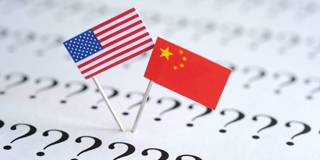The US-China trade and technology war has invited comparisons to the Cold War. For international organizations, the lesson of great-power rivalries is to focus on facilitating cooperation toward specifically defined goals, rather than attempting to establish new broad-based rules.
OXFORD – The strategic rivalry between the United States and China poses a sharp challenge to international organizations, which are now at risk of becoming mere pawns of either power. Whether multilateral institutions can retain a role in facilitating desperately needed international cooperation remains to be seen.
The Sino-American conflict is already replacing globally agreed rules with the exercise of raw power, as each side wrestles for access to resources and markets. The US is eschewing long-standing trade agreements in favor of unilaterally imposed measures. China is carving out its own economic and geostrategic sphere through bilateral partnerships and aid, trade, and investment packages under its transnational Belt and Road Initiative (BRI).
The two rivals are also competing for control of new technologies and the data that enable them. Among the top 20 technology companies in the world, nine are Chinese and 11 are American. On the Chinese side, the tech giants enjoy access to a wealth of data, because they are backed by a government that is bent on collecting it for the purpose of surveillance and establishing a social-credit system. Equally, Chinese companies are expanding their reach and access to data, such as China’s CloudWalk deal to build facial-recognition software in Zimbabwe. On the US side, the tech giants are being supported through provisions in trade agreements like the US-Mexico-Canada Agreement (USMCA), which requires cross-border data flows without restriction.

OXFORD – The strategic rivalry between the United States and China poses a sharp challenge to international organizations, which are now at risk of becoming mere pawns of either power. Whether multilateral institutions can retain a role in facilitating desperately needed international cooperation remains to be seen.
The Sino-American conflict is already replacing globally agreed rules with the exercise of raw power, as each side wrestles for access to resources and markets. The US is eschewing long-standing trade agreements in favor of unilaterally imposed measures. China is carving out its own economic and geostrategic sphere through bilateral partnerships and aid, trade, and investment packages under its transnational Belt and Road Initiative (BRI).
The two rivals are also competing for control of new technologies and the data that enable them. Among the top 20 technology companies in the world, nine are Chinese and 11 are American. On the Chinese side, the tech giants enjoy access to a wealth of data, because they are backed by a government that is bent on collecting it for the purpose of surveillance and establishing a social-credit system. Equally, Chinese companies are expanding their reach and access to data, such as China’s CloudWalk deal to build facial-recognition software in Zimbabwe. On the US side, the tech giants are being supported through provisions in trade agreements like the US-Mexico-Canada Agreement (USMCA), which requires cross-border data flows without restriction.